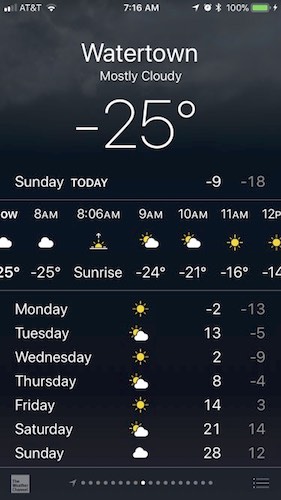We spent the weekend in my home town in South Dakota, visiting my 96-year-old father. This is what greeted us yesterday morning:
Now, that’s cold! It was cold across much of the U.S., leading President Trump to tweet this on Thursday:
In the East, it could be the COLDEST New Year’s Eve on record. Perhaps we could use a little bit of that good old Global Warming that our Country, but not other countries, was going to pay TRILLIONS OF DOLLARS to protect against. Bundle up!
— Donald J. Trump (@realDonaldTrump) December 29, 2017
That’s an innocent observation; no doubt millions of Americans made some comment about global warming when they woke up to bone-chilling cold over the last few days. But for the liberal media, Trump’s mild joke was heresy that needed to be stamped out. Thus, PBS headlined pretentiously: “Fact-checking Trump’s tweet about cold weather and climate change.” PBS’s interview was with a professor of “geosciences and international affairs” at Princeton:
PBS: Let me just remind folks what the president said on Twitter last night after noting the record forecast or the forecast for record cold on New Year’s Eve on the East Coast. He said, “perhaps we could use a little bit of that good old global warming that our country, but not other countries was going to pay trillions of dollars to protect against. Bundle up.”
Let’s take that in two parts.
First of all, is he confusing climate and weather?
Michael Oppenheimer: It’s impossible to say what was in the president’s mind, but he probably was trying to confuse other people about the reality of climate change.
This cold snap is weather. Weather is what you experience day to day. Climate is the long-term average of weather over periods of years, decades, centuries or even longer.
Sure. On the other hand, whenever it gets hot, or dry, or wet, or windy, alarmists tell us it’s another sign of global warming. How does that work? PBS helpfully explains:
PBS: So, given that distinction, do scientists see a connection between climate change and episodes of extreme weather?
Michael Oppenheimer: Yes, some episodes of extreme weather can be tied directly to the buildup of the greenhouse gases caused by human activity.
For instance, the incidents of extreme heat has increased and episodes of heat waves are increasing faster these days than they would without the buildup of greenhouse gases. And that connection has been made clearly.
Actually, it hasn’t been. But you see how that works. Hot weather = evidence of catastrophic anthropogenic climate change. Cold weather ≠ evidence of lack of catastrophic anthropogenic climate change.
How about the economic consequences of the Paris agreement? More heresy!
PBS: Let’s take the second part of what he said. He said that the United States, but not other countries, was going to pay trillions of dollars to protect against climate change.
I presume he’s talking about the requirements of the Paris accord. Is that true, what he said?
Michael Oppenheimer: That’s a complete fabrication.
For instance, the cost of the U.S. proposal to cut its emissions by 26 percent to 28 percent, that reduction would have been obtained by and large by reductions in the power sector, the so-called Clean Power Plan, electricity production. And those would have cost a few billion dollars, not a few trillion dollars.
PBS’s “expert” is dead wrong. The Clean Power Plan related only to the power production sector, and would have (granted all of the Obama administration’s dubious assumptions) contributed only a fraction of the CO2 reduction necessary to comply with the Paris agreement. A more realistic assessment of the impact of the Paris deal on the U.S. economy, not just the immediate cost of implementing the Clean Power Act, is in line with Trump’s tweet. Christine Harbin explains at the Washington Examiner:
Sticking with the deal could have cost 2.7 million lost jobs by 2025, according to a National Economic Research Associates study. And the effects would be widespread, including a loss of 440,000 manufacturing jobs, according to NERA’s numbers. Meanwhile, according to proponents’ own data, the agreement would have no discernible effect on global temperatures.
And the longer the agreement ran, the worse it would get, according to NERA’s data. By 2040, production (and thus employment) would be decimated in a host of industries, including a 38 percent cut in iron and steel, 31 percent in natural gas, and 86 percent for coal. At that point, the total economic cost to the U.S. would approach $3 trillion in lost gross domestic product and 6.5 million industrial jobs.
It is hard to get a lot of nuance into a tweet, but once again, Trump was essentially correct and his dogmatic “fact checkers” were about as wrong as wrong can be. As Trump himself explained on Saturday:
I use Social Media not because I like to, but because it is the only way to fight a VERY dishonest and unfair “press,” now often referred to as Fake News Media. Phony and non-existent “sources” are being used more often than ever. Many stories & reports a pure fiction!
— Donald J. Trump (@realDonaldTrump) December 30, 2017

Notice: All comments are subject to moderation. Our comments are intended to be a forum for civil discourse bearing on the subject under discussion. Commenters who stray beyond the bounds of civility or employ what we deem gratuitous vulgarity in a comment — including, but not limited to, “s***,” “f***,” “a*******,” or one of their many variants — will be banned without further notice in the sole discretion of the site moderator.